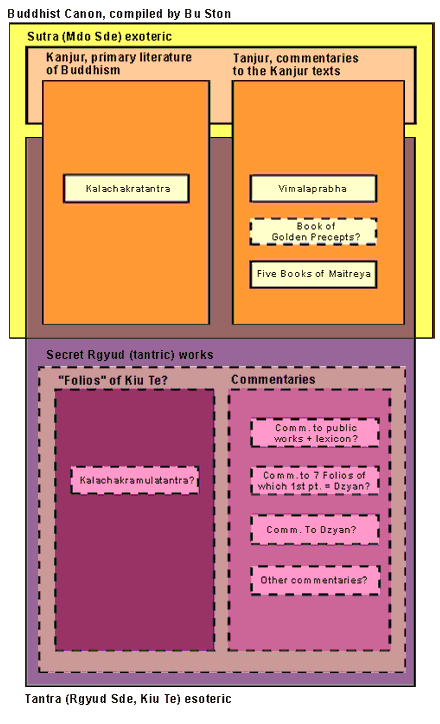Difference between revisions of "Dzyan"
From Ingmar de Boer
(→Diagram on the Origin of the Book of Dzyan) |
(→Diagram on the Origin of the Book of Dzyan) |
||
| Line 81: | Line 81: | ||
<P class="line"> | <P class="line"> | ||
| − | Author, Title, Publisher, Place, Year | + | Author, <i>Title</i>, Publisher, Place, Year |
<OL> | <OL> | ||
<LI> | <LI> | ||
Besant, A. en Leadbeater, C.W., <I>Commentaren op "De stem van de | Besant, A. en Leadbeater, C.W., <I>Commentaren op "De stem van de | ||
| − | stilte"</I>, Minerva, Weltevreden | + | stilte"</I>, Minerva, Weltevreden, 1928 |
</LI> | </LI> | ||
<LI> | <LI> | ||
Revision as of 00:53, 26 March 2016
Diagram on the Origin of the Book of Dzyan
- The works in the canon of the Tibetan Buddhists consist of the Kanjur and Tanjur. They are publicly known, now as they were in the days of Blavatsky. These works are represented by the yellow and orange areas in the diagram.
- The Kanjur works, according to tradition, are revelations of the Buddha.
- The Tanjur works are commentaries on corresponding Kanjur works.
- The canon is divided in two main sections, a sutra section and a tantra section. The tantras are called Kiu Te, by Blavatsky. (purple areas in the diagram)
- Within this section in the Kanjur we find the Kalachakratantra. One of its commentaries in the Tanjur is the Vimalaprabha.
- In the preface to the Voice of the Silence, H.P. Blavatsky mentions the Books of Golden Precepts as its source. This book is said to be on all altars of the temples associated with the "contemplative or mahayana (yogacharya) schools". It must therefore be in the public books of Kiu Te. It was taken from the same "series" as the book of Dzyan, so it must be a commentary and therefore we can expect it to be part of the Tanjur. We can also see very easily that it is not a Kanjur work by looking at the text of the Voice, which is clearly not in any way a revelation of the buddha.
- The Five Books of Maitreya, stanza's of which were planned to be in the Secret Doctrine, are also in the Tanjur.
- Blavatsky speaks of secret books of Kiu Te (she mentions seven folios).
- Further she speaks of a series of secret commentaries to these books, of which the Book of Dzyan is the first volume. There should also be a commentary on Dzyan.
- There would also be a series of secret commentaries on the public books of Kiu Te with a "glossary".
The public Kanjur and Tanjur
The public books of Kiu Te
The secret books of Kiu Te

Literature
Author, Title, Publisher, Place, Year
- Besant, A. en Leadbeater, C.W., Commentaren op "De stem van de stilte", Minerva, Weltevreden, 1928
- Blavatsky, H.P., Collected Writings vol.VI, Theosophical Publishing House, Wheaton (Ill.), 1975
- Blavatsky, H.P., Voice of the Silence, The, Theosophical Publishing House, Adyar, 1985
- Newman, John, Paramadibuddha (the Kalacakra mulatantra) and Its Relation to the Early Kalacakra Literature, The-, in Indo-Iranian Journal no. 30, 1987
- Reigle, David, Blavatsky's Secret Books, Wizards Bookshelf, San Diego, 1999
- Reigle, David, New Light on the Book of Dzyan, in Symposium on H.P. Blavatsky's Secret Doctrine ... Proceedings, Wizards Bookshelf, San Diego, 1984
- Sinnett, A.P., Letters of H.P. Blavatsky to A.P. Sinnett, The -, Theosophical University Press, Pasadena, 1973
- Spierenburg, H.J., Buddhism of H.P. Blavatsky, The-, Point Loma, San Diego, 1991
- Spierenburg, H.J., Stem van de Stilte, De-, in Theosofia, 1989
- Zirkoff, Boris de, Aan de bron van de occulte traditie, Theosofische Vereniging in Nederland, Utrecht, 1977